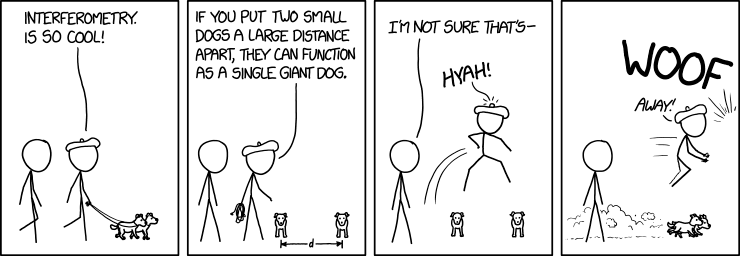Radio Interferometry SS 2020 (astro8404)
Dr. Lydia Moser, Dr. Stefanie Mühle, Dr. Alvaro Sánchez-Monge, Prof. Dr. Frank Bertoldi
(https://xkcd.com/1922/)
Join the gold rush in the "Golden Age of Astronomy"!
Now in its ninth year of operations, ALMA produces on average about 700 GB/night of high-quality astronomical data turning the public ALMA archive into a goldmine for those knowledgeable in the art and craft of radio interferometry.
The Master-level course "Radio Interferometry: Methods and Science" offers hands-on training in the data reduction and analysis of radio interferometric data for Master students, PhD students and more senior astronomers.
After a brief review of the basic concepts of radio interferometry, the participants are guided through the various steps necessary to create fully calibrated data cubes from interferometric raw data. In the second part of the course, the participants learn how to construct images and data cubes from the calibrated data and how to analyze their interferometric data. With terminals connected to powerful compute servers at their finger-tips, the participants can practice the individual steps on their interferometric data set already in class using the versatile Common Astronomy Software Applications (CASA) package.

How to participate
This course is open to Master students, PhD students, postdocs, more senior astronomers and scientists of related fields.
Students in Bonn and Cologne:
If you are a Master student at the university of Bonn or Cologne, you can take this course for credit, obtaining 4 CP.
Following the hands-on approach of the course, the coursework relevant for the final grade consists of assignments related to the data reduction and analysis of a small interferometric dataset, followed by a presentation (Referat, 15 min length) and a short paper summarizing the data reduction and the analysis (5-12 A4 pages).
Please note that due to the corona pandemic, the CIP-pool is currently closed for the public. Therefore, the lectures will be given exclusively via zoom until further notice. If you intend to take the course, whether for credit or not, please register by email to arc at astro.uni-bonn.de before Tuesday, 21 April 2020. Only registered participants will be able to log into the zoom session with their password.
For equal opportunity regarding computing ressources, the German ARC node offers access to one of their powerful compute servers to all students who take this course for credit. Starting a week before the first lecture, account forms will be sent to all registered eligible students. In order to get access to the compute server, all "for credit" students are requested to return the filled form before Tuesday, 21 April 2020. "For credit" students are also expected to attend all the lectures/tutorials and to register for the exam on BASIS before the deadline.
Other participants:
As in previous years, we offer remote access to the course on a best-efforts basis using the videoconferencing system zoom, which the participants can join without charge and on a variety of platforms. If you would like to follow the course from a remote location, please contact us before Tuesday, 21 April 2020 at "arc at astro.uni-bonn.de". If you would like to participate in the hands-on data reduction sessions, please install CASA 5.6.1 on your home server and download the data sets from the material's page before the start of the course. Detailed installation instructions will be posted on the material's page in early April.
Logistics:
Following the decision of the university of Bonn to postpone the start of all courses of the summer term 2020, the lecture will start on 22 April 2020. In view of the shorter lecture period this summer, we ask all participants to take the preparatory steps outlined above before the start of the course on 22 April.
Time & date: |
Wednesdays, 22 April 2020 - 15 July 2020, 10:15-12:45 CEST (08:15-10:45 UT), including short breaks (the zoom session opens at 10:00 CEST) |
Location: |
CIP-Pool (AIfA, room 0.007) or via zoom (please register first); due to the measures against the COVID-19 virus, the lectures will be given exclusively via zoom until further notice. |
Organization: |
Stefanie Mühle, muehle at astro.uni-bonn.de, AIfA R. 1.002, currently in home office |